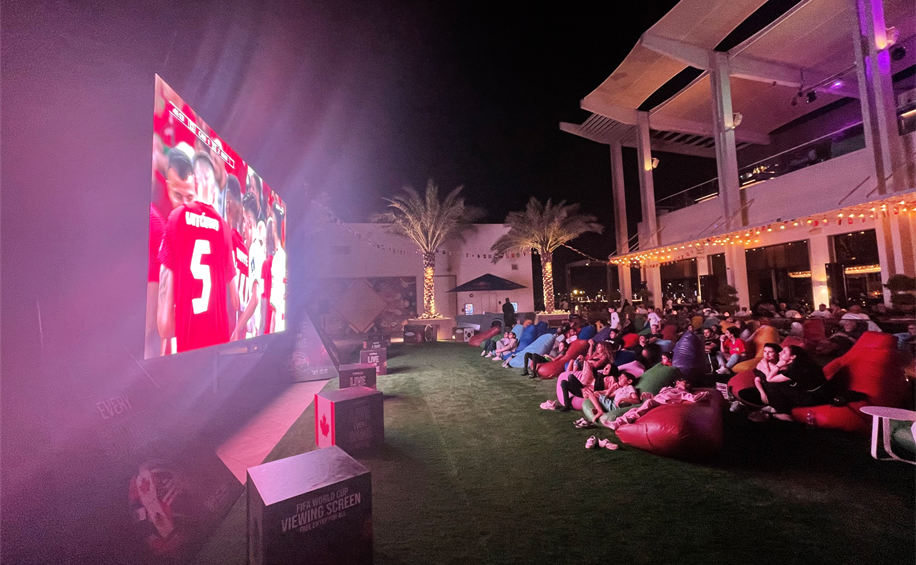At one of the many outdoor venues where people in Abu Dhabi can gather to watch the World Cup games on a big screen, football fans gripped the sides of their chairs when Canada scored in Friday night’s game against Morocco. The TV announcer said, “It’s ok, ok. Let’s not worry. We’re still ahead by a goal. It’s ok. Don’t worry.”
The TV announcer wasn’t comforting the players, but rather the audience. This is the personalized, passionate style of game commentary in the Arab-speaking world in general. But this time it felt different. I have little doubt that most of the Arab audience watching that game also dream of having Canadian citizenship, having a place to live permanently where they would be free of wars, crushing poverty, corruption — and have socio-economic and educational opportunities not available to them in most of the Arab world. But the cheering was for Morocco. As it was for Saudi Arabia and Qatar in their matches.
The announcer’s commentary echoed the FIFA revival of the pan-Arabism of the pre-Gulf Wars years, a unified rally against the hypocrisy felt toward European comments about Qatar, particularly concerning migrant labor and One Love armbands. While the facts are probably being skewed on all sides, where is the mention of the thousands of Western migrants in Qatar working in companies that employ these same brown migrant workers as they live a five-star life they could never dream of in their home countries? Hypocritical just a little?

The One Love armbands that Qatar initially banned have come to sound like an oxymoron. They originated as an inclusiveness campaign by the Royal Dutch Football Association (KNVB), but Western media has had only one love — LBQGT rights. Sure, it would be great if homosexuality was legal in Qatar, but homosexuals are not hunted down in Qatar, as Western media portrays them to be. Even back in the 1990s, in this country that is a village, there was a “don’t ask, don’t tell” policy around homosexuality, including around one of its best-known British TV personalities.
LBGQT rights in Europe came long after other human rights were secured, during a time of peace and stability. In the Arab and Islamic worlds, other groups need urgent equal rights and love. Yet there was no European One Love for Iranian protestors; nor the broken countries of Syria and Iraq; nor the Lebanese struggling with the world’s worst currency; nor many other injustices related to the Arab or Muslim worlds, from the immigrants in Europe to the Uyghurs in China. Thus, the hypocrisy goes in many directions, not just Qatar’s.
There has been little Western coverage of people in Qatar voicing some of this: fans at one of Germany’s games held up pictures of former Germany player Mesut Özil while covering their mouths. Özil resigned from his German team in 2018, saying “I am German when we win, but I am an immigrant when we lose.” One Love didn’t acknowledge the Iranian players fumbling through their national anthem. Nor did One Love care about people shouting at the Israeli journalists filming in the middle of Doha. The Israeli journalists were covering their citizens, who were allowed to come to the games while people in Gaza remained trapped in a large human cage.
One Love indeed comes off as a singular rather than plural. While it will probably only last a World Cup season, this pan-Arabism rally around the hypocrisy of One Love can be seen in gatherings across the region, boosted by a ray of hope around Morocco’s remarkable winning streak.
On the streets in Doha, there is another form of love: acceptance of differences, at least in public. Back in 2010, when Qatar won the FIFA bid, the biggest shock to many watching TV and social media at the time was seeing Sheikh Hamad, then the Emir of Qatar, in a Western business suit, hugging his wife, Sheikha Mouza. This was unheard of public behavior among Gulf rulers. It was viewed as pandering to the West.
Twelve years later, Qatari officials and citizens are showing up in their national dress and have turned it into a marketing tool during the games, selling the modified versions of their thobes and gutras to visiting football fans. But Qataris do not expect anyone living amongst them to dress like them, and do allow others’ fashion senses, whether they are miniskirts, hijabs, or business suits. Could Qatar claim this as One Love? Maybe, as One Love does seem to be mostly about outerwear appearances.
“It’s ok, ok. Let’s not worry. We’re still ahead by a goal. It’s ok. Don’t worry.” It doesn’t feel like the world is ahead by one goal when it comes to One Love.
Alia Yunis has worked as a filmmaker and writer in many parts of the world. Her feature documentary, “The Golden Harvest,” is currently in film festivals. Her fiction, including “The Night Counter” (Random House), and non-fiction writings have appeared in numerous books, magazines and anthologies and have been translated into eight languages. She is a visiting associate professor at New York University Abu Dhabi.

